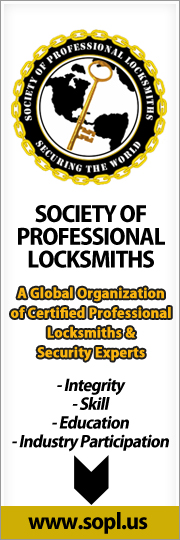|
Written By: Barry Campbell, Director of Operations SOPL  Kurtis Ming, from CBS 13 in Sacramento, recently reported on “The Dark Side of the Locksmith Industry.” There are some notable things about this report, both good and bad. The first is his reference to the “one time nature of locksmiths.” While most professional locksmiths endeavor to foster relationships with repeat, long-term customers, I think Ming has pointed out a popular misconception – that the main reason to call a locksmith is when you've locked yourself out of your home or vehicle, or perhaps to replace a lost car key. Sure, people who think like that probably also think the local hardware store carries the best in lock hardware, but the point is that there is a huge potential market out there of people who simply don't know any better. Then there is the “simple lock picking” comment. More correctly, the report might have focused more on the “simple lock.” Not hard to teach someone to pick open a hardware store lock, but most locksmiths can combinate even these locks to be more difficult to pick. Professional locksmiths also may have the tools and knowledge to enable them to bypass even the “unpickable” lock without damage. Part of the problem, in this case, may have come from within the industry. How many of you have had a call to “pop” a lock? Many are easy, but many are not – sometimes by design and sometimes because of the condition of the lock. Regardless, the implication that picking is easy and should not cost much is unjustified. I rather like the response of locksmith David Knosalla in an article from The Princeton Union-Eagle, where he was able to quickly and easily open a safe - “You called for an expert and that's what you got.” Now, if you carry just a long-reach tool and a drill for all your unlocks, you're no expert; but if you are a professional with the tools and knowledge to tackle virtually any situation, you are justified in charging what you are worth. The article improves when Ming identifies the “locksmiths” called out to unlock the homes, including their license numbers. Yes, what more proof do you need that scammers can get a license whenever they need to? Even better, he confronts a spokesman from the Bureau of Security and Investigative Services that oversees the locksmith licensing. The interview was priceless: Heimerich told Call Kurtis BSIS had received 281 locksmith complaints in the past two years, but Call Kurtis has learned only 17 locksmiths were actually cited, and none had their licenses revoked. That's right; 281 complaints, 17 cited, and not a single license revoked in two years! How many times does it need to be proven? Licensing neither stops the scammers nor protects the consumer! The saddest part of the report, though, had to be the recommendation from the California Locksmith Association (CLA). Given that the ineffectiveness of licensing was just shown, they could only recommend that consumers should verify the locksmith's license. Was that really the best they could do? So in the darkness of it all the Society of Professional Locksmiths has helped shine a light on the shady business of licensing and how it is contributing to a false sense of security and a false sense of safety for the consumers. As these news reports increase we may see some bright sides in the coverage but in the end we find that relying on the idea of someone being licensed is like standing in the dark. Can anyone seriously claim that licensing has illuminated our industry?
4 Comments
5/9/2014 09:03:28
Too bad the citizens can't file a lawsuit against the authors and those who supported the bill and the organization who is supposed to enforce the laws for fraud and failure to perform. Since the bill/law is just a money maker and there is no intent to enforce, the law need to be repealed.
Reply
Liz Ellsworth
5/27/2014 09:17:54
This article makes some good points. Way more people need to understand what locksmiths can do for them. It's not all about making keys and unlocking car doors.
Reply
6/23/2014 14:33:41
Just to start off my intent is not defend BSIS or the law.
Reply
6/26/2016 14:49:14
Licensing, if it did what is was designed for, and was fully and properly enforced, would be a good thing. Where the problems begin is enforcement rarely, if ever, happens and the licensing ends up becoming an additional tax on the business instead of protecting the consumer and the business.
Reply
Your comment will be posted after it is approved.
Leave a Reply. |
Categories
All
|
Services |
Company |
|



 RSS Feed
RSS Feed
